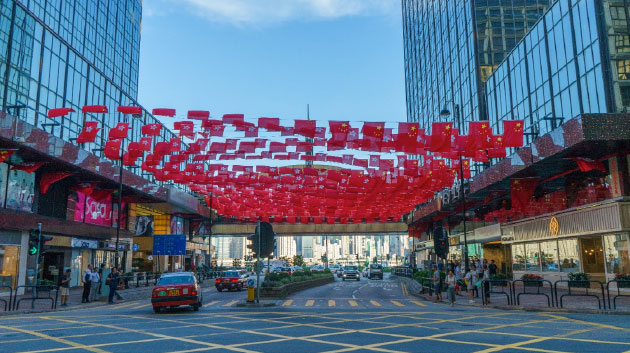Chinese Immigrants in Hong Kong Realize What Liberty Truly Means
Hong Kong's China-ization vs. China's Hong Kong-ization
Photo / Shutterstock.com
Key points in this article:
- While Hong Kong is in danger of becoming China-like, there are Chinese immigrants who realize the value of liberty, and want to make China more like Hong Kong
- Hong Kong can share their joys of prosperity by teaching China democratic values and how to attain prosperity
- The international community should protect and support those in Hong Kong fighting to spread the values of liberty
It has been 20 years since Hong Kong’s handover to China from Britain. The Beijing government promised them 50 years of autonomy, and Hong Kong used that opportunity to become the global financial center for Asia.
Chairman of China, Xi Jinping, is visiting Hong Kong in preparation for attending the 20th anniversary ceremony vowing to “protect the future of the ‘One Country, Two Systems’ policy,” but he continues to increase political pressure on Hong Kong. The values of liberalism and democracy that Hong Kong cultivated may all come to nothing if they continue to lean towards China.
On 28 June, the Wall Street Journal published an article entitled “Goodbye, Beijing: Chinese Immigrants Embrace Hong Kong Way of Life”.
It reported that many university students from Mainland China studying in Hong Kong prefer to remain there after graduation. “They arrive in Hong Kong and can’t believe the level of freedoms. They see students challenging teachers in the classroom and say, ‘I want this for myself,'” relates Jason Ng, an author who teaches law at the University of Hong Kong.
There have been over 1 million Chinese immigrants since Hong Kong’s handover, amounting to 13% of the population of Hong Kong (in 2016). The government speculates that if immigration continues at the current rate, Mainland immigrants will make up 25% of the population by 2041.
The article stated that Hong Kong pro-democracy politicians want to bring an end to the “one-way permit” program instigated by the Beijing government. In that “They say it smacks of China’s use of migrants to dilute ethnic populations in restive”, per the article.
A study conducted last month by the University of Hong Kong suggests that 84% of people in Hong Kong between the ages of 18 and 29 think of themselves, not as ‘Chinese’, but as ‘Hong Kong people’. In comparison to the mere 68% who thought so back in 1997. It is clear that the youth have truly established an independent identity.
The people are wary that the Beijing authorities will send in a flood of immigrants to purge the values of Hong Kong, but in fact many of the Mainland visitors awaken to Hong Kong’s values of liberty during their residence. This gives them an opportunity to realize the problems prevalent in Mainland China.
Hong Kong Can Become China’s Teacher
How then should Hong Kong interact with China?
Master Ryuho Okawa, founder of Happy Science, gave a public lecture in Hong Kong in 2011. His message was this:
“Those who get a taste of prosperity, even once, can never forget the feeling. People who enjoy prosperity must teach others how prosperity can be attained. You people are teachers. While you may be considered to be a small part of China, you are their teacher: you can teach them, and lead them . . . The people of Hong Kong can teach the billions of people in China, and they will follow you. You, the people of Hong Kong, were able to change yourselves: now the people of China can change themselves too.”
In the book “Guidance for the Rebirth of Japan” published in 1995, two years before the Hong Kong handover, Master Okawa said:
“With the ‘One Country, Two Systems’ policy, China will absorb Hong Kong, but the effect will be the opposite of what you expect: China will become Hong Kongized. Southern China will be drawn to Hong Kong creating a China that can democratize and a China that can’t. I suspect it will cause a rift in Mainland China.”
In the August 2016 issue of The Liberty Magazine, we interviewed Benny Tai, the initiator of Occupy Central, which eventually led to the Umbrella Movement. In it, he said, “In the Law School here, we have students from Mainland China, and so they will be able to understand more about the things happening in Hong Kong”; and this could lead to China’s democratization.
Chinese authorities have recently persecuted Benny Tai for public disturbance, along with 8 other Hong Kong activists. Persecutions and arrests of people who are fighting for the democratization of China is not something that can be forgiven. Each voice of the international community must gather in supporting the noble cause that these people are risking their lives for.



















